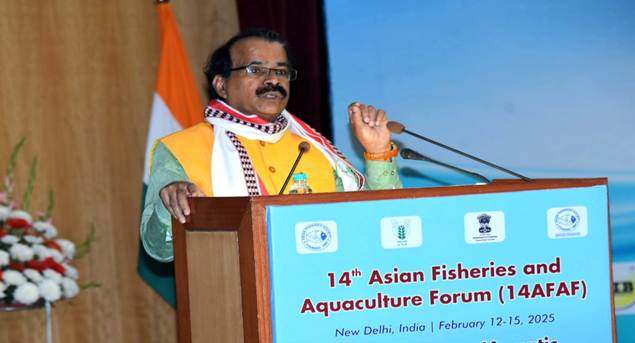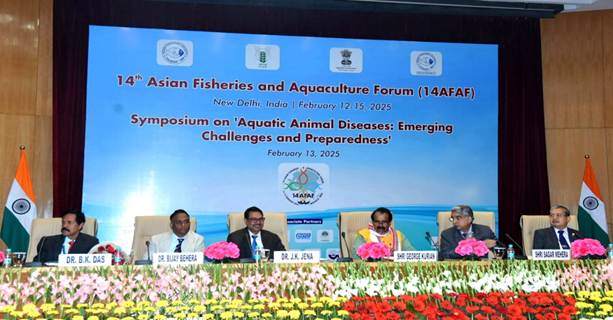Ministry of Agriculture &
Farmers Welfare
Union Minister Shri George Kurian inaugurates symposium on “Aquatic Animal Diseases - Addressing emerging challenges and preparedness”
Union Minister underlines the importance of nutrition and biosecurity in aquaculture
Shri Kurian emphasizes the need for continuous research and innovation in aquatic animal health management
प्रविष्टि तिथि:
13 FEB 2025 4:43PM by PIB Delhi
Union Minister of State for Fisheries, Animal Husbandry and Dairying Shri George Kurian has inaugurated the symposium on 'Aquatic Animal Diseases: Emerging Challenges and Preparedness' organised at the ICAR Convention Centre, Pusa Campus, New Delhi today. The symposium was organised as part of the 14th Asian Fisheries and Aquaculture Forum (14AFAF) meet being held here from 12-15 February, 2025 with the theme “Greening the Blue Growth in Asia-Pacific.

Speaking on the occasion, Shri George Kurien said appreciated ICAR for its initiative in organizing the symposium and emphasized the "One Earth - One Family" approach, stressing the importance of nutrition and biosecurity in aquaculture. He highlighted that sustainable aquaculture practices are key to ensuring food security, livelihoods, and economic growth in India. He acknowledged the efforts made under various government initiatives such as PMMSY and emphasized the need for continuous research and innovation in aquatic animal health management. He called for a multi-stakeholder approach, involving government agencies, research institutions, and industry players, to work together towards strengthening disease surveillance, enhancing biosecurity protocols, and improving diagnostic and therapeutic measures.

Dr. J.K. Jena, DDG (Fisheries Science), ICAR, and Convener of the symposium, provided an overview of the event, thanking the Government of India and Network of Aquaculture Centers in the Asia Pacific for their support. He emphasized about the need of strong biosecurity measures and discussed the ongoing NSPAAD Phase II and INFAR project, which aim to develop strategies for better disease control in aquaculture. He emphasized the Network project on Fish Health as a crucial initiative for advancing disease research and control in aquaculture. which focuses on disease management and early response mechanisms to mitigate potential risks in fish farming. Furthermore, he stressed that disease management will be critically important for the future in light of the diversification of aquaculture with introduction of new species, new systems, and the expansion of aquaculture. He also highlighted the importance of diagnostics, therapeutics, and vaccines for effective disease management in aquaculture.
Shri Sagar Mehra, Joint Secretary, Department of Fisheries, Ministry of Fisheries and Animal Husbandry and Dairying in his address, highlighted the vital role of fisheries in supporting livelihoods and the economy. He stressed the importance of national, regional, and local-level strategies to combat disease outbreaks effectively. He underscored the need for proactive response mechanisms, recognizing that disease transmission is often linked to live animal movement. He called for enhanced biosecurity measures and early detection systems to safeguard the sustainability and economic viability of the aquaculture industry.
Dr B.K. Behera, Chief Executive, NFDB emphasized the need to institutionalize fish disease surveillance programs in India to ensure systematic disease monitoring, early detection, and effective control. He highlighted the importance of establishing disease-free zones in key aquaculture areas to prevent the spread of infections and enhance biosecurity measures. Institutionalizing surveillance would require integrating it into national aquaculture policies, strengthening regulatory frameworks, and ensuring sustained funding and implementation across states.
Dr. Eduardo Leano, NACA, Thailand provided insights into NACA’s mission since 1990, operating in 20 countries and spearheading five key disease surveillance programs. He highlighted the growing risk of antimicrobial resistance (AMR) in aquaculture and stressed the urgent need for a sustainable, internationally coordinated approach to aquatic biosecurity.
Earlier Dr. B.K. Das, Director of ICAR-CIFRI, delivered the welcome address, highlighting aquaculture advancements and the importance of strengthening disease management. He emphasized the Network project on fish health under National Surveillance Programme for Aquatic Animal Diseases (NSPAAD) as a key initiative for improving disease surveillance and fostering innovation in aquatic health solutions.
Dr. P.K. Sahoo, Director, ICAR-CIFA, delivered the Vote of thanks, acknowledging the contributions of all dignitaries and participants.
The Asian Fisheries and Aquaculture Forum (AFAF) is a triennial event of the Asian Fisheries Society with its Headquarters in Kuala Lumpur, Malaysia. This 14AFAF is being jointly organized by the Asian Fisheries Society (AFS), Kuala Lumpur; Indian Council of Agricultural Research (ICAR), New Delhi; the Department of Fisheries (DoF), Government of India; and the Asian Fisheries Society Indian Branch (AFSIB), Mangalore. This prestigious event is being hosted in India for the 2nd time after the 8AFAF held at Kochi in 2007.
****
MG/RN/KSR
(रिलीज़ आईडी: 2102768)
आगंतुक पटल : 1944